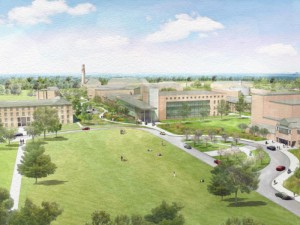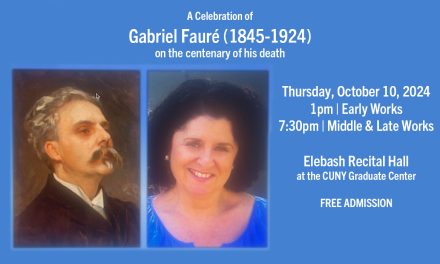
An artist’s rendering of a proposed Interdisciplinary High Performance Computation Center, part of the CSI Master Plan.
CSI will host a two-day workshop on Data-Intensive Computing on July 26-27, 2011 from 8:15am to 4:45pm in the Lecture Hall of the Center for the Arts.
The event is designed to cover topics in data-intensive computing including graph theoric and combinatoric approaches in bio-informatics, financial data analytics, linguistics, and national security. The two-day workshop will focus on new techniques and ways of implementing large-scale data analysis on high-performance computing systems.
There is an attendance fee of $85 per person ($50 for students) and breakfast, lunch, and refreshments will be provided each day. Advanced registration is required.
Noted representatives from academe, government research labs, and industry will participate in the workshop, including the following:
Dr. David A. Bader, Georgia Institute of Technology, will present on, “Opportunities and Challenges in Massive Data-Intensive Computing.” Bader will discuss the opportunities and challenges in massive data-intensive computing for applications in computational biology, genomics, and security. Bader is a lead scientist in the DARPA Ubiquitous High Performance Computing (UHPC) program and is a leading expert on multicore, many core, and multithreaded computing for data-intensive applications such as those in massive-scale graph analytics.
Other notable speakers from academe are Drs. Alok Choudhary, John G. Searle Professor and Chair of the Electrical Engineering and Computer Science, Kellogg School of Management and Director for the Center for Ultra-Scale Computing and Information Security at Northwestern University; Bud Mishra, Courant Institute of Mathematical Science; Alex Pothen, Professor of Computer Science and Director of the Institute for Combinatorial Scientific Computing and Petascale Simulations at Purdue University; and, Jiahong Yuan, University of Pennsylvania.
John Avery, SunGard Global Services, will discuss, “Data in Financial Services—Use It or Lose It!” He will address the “BigData” movement and how time, cost, and information asymmetry are critical competitive advantages in financial services. Avery, who has been quoted in numerous industry publications including Wall Street & Technology and Hedge Funds Review, has been building, managing, integrating, and testing software applications on Wall Street for the past 13 years.
Edward A. Epstein, IBM T.J. Watson Research Labs, was part of the Watson/Deep QA project, the computer that won the game show, Jeopardy! He was responsible for scaling out Watson’s computation over thousands of compute cores in order to achieve the speed needed to make the computer competitive for the live game.
Dr. Reinhardt of Microsoft will be heading the workshop, “Enabling Non-Graph-Expert Use of Very-Large-Scale Graph Analysis.” This talk will describe an interface for graph analysis known as the Knowledge Discovery Toolbox (KDT). Dr. Reinhardt will explain KDT’s content and demonstrate its use to solve sample graph-analytic workflows and sketch future directions.
These and others will take part in this workshop to address the challenges that confront researchers in how to discern meaningful information and relationships from the plethora of data now at the disposal of researchers.
For more information, send email to: hpcworkshops@csi.cuny.edu.
















